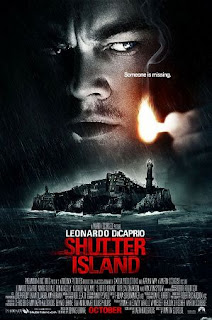Shutter Island
 Martin Scorsese has always been a stylist. Looking back at his best films: Taxi Driver, Raging Bull, King of Comedy, Goodfellas, the style leaps from the screen, but in those films there was something behind the style. But occasionally his films have been all sizzle and no steak, and have been lots of fun, but nothing to paste in the memory book. For examples I think of Cape Fear and now, Shutter Island.
Martin Scorsese has always been a stylist. Looking back at his best films: Taxi Driver, Raging Bull, King of Comedy, Goodfellas, the style leaps from the screen, but in those films there was something behind the style. But occasionally his films have been all sizzle and no steak, and have been lots of fun, but nothing to paste in the memory book. For examples I think of Cape Fear and now, Shutter Island.Scorsese is also a living encyclopaedia of film history, and Shutter Island contains many references to the past, both glorious and not. Scorsese has mentioned films as diverse as the silent German film The Cabinet of Dr. Caligari and Frederick Wiseman's documentary Titicut Follies, but when this film comes out on home video a fun game might be shouting out other "quotes" from films. Most of the references can be grabbed from a kind of schlocky B-film legacy seen in the horror films of Roger Corman or drive-in exploitation films of the sixties and seventies. Scorsese is aiming to grind these B-movie entrails into A-movie sausage, but the effort falls short. Shutter Island isn't boring, and it's mostly fun, but it's not a great film.
We start with Leonardo DiCaprio as a U.S. marshal, seasick on a ferry bound for the titular place, which is in Boston harbor and houses a mental hospital for the criminally insane. The early dialogue with his new partner, played by Mark Ruffalo, is so amateurish that we are immediately on alert that all isn't probably what it seems--"So you're my new partner?" DiCaprio asks Ruffalo. Of course there's a thick fog, and the captain ominously tells them the ferry is the only way on or off the island, and then, "Storm's coming," followed by chords that resemble the blasts of a foghorn. Scorsese clearly has decided to jettison all subtlety.
DiCaprio and Ruffalo are there to investigate the mysterious disappearance of a patient, a woman who murdered her three children. They meet with the oleaginous head doctor, played with slippery ease by Ben Kingsley. They interview other patients, and as a hurricane hits the island they explore the place as if it were levels of a video game--graveyard, Civil-War-era fort, with a lighthouse as the ultimate destination. As the film progresses the plot is revealed in onion-like layers--it seems that DiCaprio's wife (Michelle Williams, seen in flashback) died in a fire, and the killer may be a patient on the island. All sorts of conspiracy theories are espoused, tying in to the Nazis (Max Von Sydow plays a German doctor who likes to listen to Mahler--why not Wagner?) and the HUAC committee. In between we see DiCaprio flashing back to his experiences as a soldier liberating the Dachau concentration camp.
The film is convoluted and implausible. By the time Patricia Clarkson shows up (after a scene with an onslaught of rats) and gives us a whole new batch of information, I was checking out. But yet the rug is still to be pulled out from under us. I won't dare spoil it, but the savvier viewer will have it figured out. The ending, in which all is explained, is long and laborious, and even includes visual aids. If it were a contemporary story (it's set in 1954) no doubt a PowerPoint presentation would have been included.
So what remains is Scorsese's flair. He's also been a filmmaker that liked to use every color in the big box of Crayolas. He teams with frequent collaborators Robert Richardson (cinematographer) and Thelma Schoonmaker (editor) to create a hurlyburly concoction of sight and sound. There are several dream sequences, and I've never been a big fan of them in any film. They seem like a cheat to me, a lazy way to express the theme of a story, without the rules otherwise associated with narrative story-telling. In the Dachau flashbacks, we get a long tracking scene of American G.I.s machine-gunning German guards, which is stunning to behold but makes no sense, as the guards are killed one by one down a line--wouldn't they be shot all at once?
Shutter Island is a B-movie dressed up like a classy Hollywood release, and as that goes makes for moderately intriguing entertainment. I give it a slight thumb's up on that basis, but I do not count it as one of Scorsese's great works, and instead can't escape the impression that he's slumming.


Comments
Post a Comment